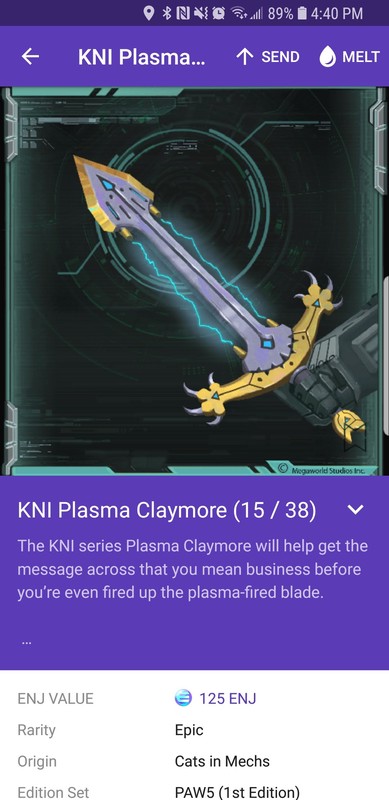This week's Enjin writing contest is all about melting fees. "Hey bwar, what the hell are melting fees?" Well I'm glad you asked, loyal reader. Melting fees are a fee placed on "melting down" items back into Enjin Coins (ENJ). The fees go back to the developers who originally minted the items and backed them with ENJ. So in simple terms, you can break down your Enjin backed items but you likely won't receive their full value due to melting fees.
Melting fees are in my opinion totally pointless. The fee potion of an item essentially ends up being a way for developers to artificially raise the value of items in their game and discourage players from melting items. In essence it boils down to developers manipulating consumers.

It feels pretty cool to open up my Enjin wallet and see my KNI Plasma Claymore. It has a value of 125 ENJ but because of a 50% melting fee, the reality is it's only worth half of that. It seems a bit silly to even display the artificial value. As a user I'll never see that 125 ENJ because of the 50% melting fee. Even if I wanted to trade my item to another user, I'd be hard pressed to convince someone it's worth anything more than what I could melt it for. Before today I had no idea my badass sword was only worth half of what I had thought, thanks melting fees.
The ENJ backed value fixes the price to the minted value and then the melting fees deflate that value. It might look nice to see high valued items in a game but if that value is simply inflated by melting fees, it's purely smoke and mirrors. Imagine a game that decides to use a 99% melting fee (I'm not sure if that's even allowed), a $1 item is actually only worth $0.01. It sure looks good to see that item in your inventory but the value is a total lie.
I would liken the whole melting fee situation to one of the most crooked practices in the world, currency exchange. At any point in time you can look up currency exchange values but if you go to a bank or money exchange, you will never get that rate. Whoever is exchanging your money always takes a cut aka a melting fee. Now this fee isn't as steep as we are seeing being used for melting fees but it shares the same idea. Every time you want to swap currencies, you lose a bit more currency. These types of transactions are what lures me away from fiat and into cryptocurrency, so it's a bit disheartening to see a practice like melting fees being employed.
For me, I got my item for free so the melting fee isn't that big of a deal. In the case of a developer giving out items for free I can at least understand the melting fee. It discourages players from melting items as soon as they get them, which means players are more likely to keep the items and check out the game. I understand that side of things but I can also see that it's a practice that does not have the consumer in its best interest.
But what about when a player has bought the item directly from the developer? The item immediately loses a percentage of its value due to melting fees. This now leads to two unintended scenarios, players are more likely to look to secondary markets to purchase items (ie. directly from other players) and developers profits are now locked up in melting fees. Seems silly, doesn't it?
It's very nice to have an option to liquidate in game items. I personally think it's one of the best features of ENJ. Say you decided in put $100 into a game you enjoy and a few months later you grow tired of the game, you now have an opportunity to sell off your items and reinvest that money to a new game. Unfortunately by backing items with ENJ developers now don't really make any profit from in game items. Personally, I'd much rather just see a mark up on item sales. It's much more upfront and honest. There is no deception on what items are worth and developers earn their share up front. Seems like a win for both sides.
So my conclusion? I can understand the use of melting fees on freely given out items. It's still a deceptive and manipulative tactic but I can understand it. On items purchased by the consumer, I am absolutely against melting fees. Developers should just use a markup on items. The melting fee just delays any earnings they would ever see from items sold and the entire practice of melting fees feels designed to deceive consumers.
Comments